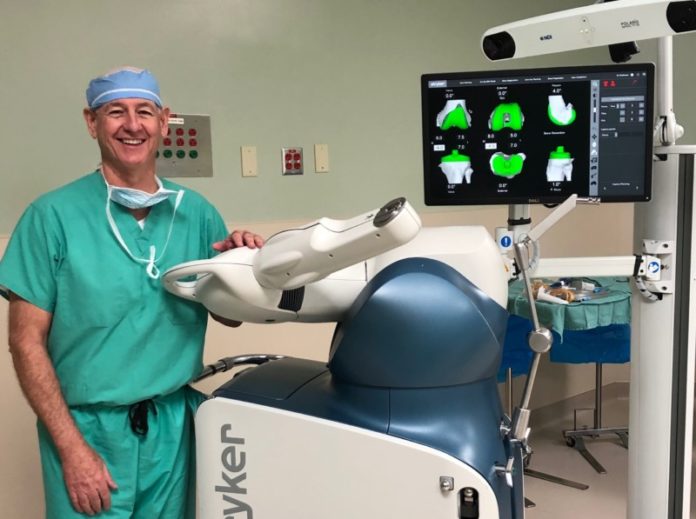Outpatient total hip and knee replacement surgery is one of the most rapidly advancing areas of medicine. Recent developments in state-of-the-art surgical technology, combined with innovative anesthesia techniques, is changing outcomes for patients at the Bone and Joint Institute of Tennessee.
Hip and Knee Replacement Surgery
“In orthopaedics, we have improved both the surgical procedures themselves, as well as the use of robotic surgery,” says Paul Thomas, M.D., who has specialized in hip and knee replacement surgery and sports medicine at the Bone and Joint Institute of Tennessee for nearly 30 years. “But the robot is nothing more than a tool I use in surgery to help me do the very best joint replacement that I can possibly give the patient.”
During a robotic-assisted hip or knee replacement, the robot recreates the exact joint that the patient had prior to surgery. “It used to be that patients would ask me what kind of knee I’m going to put in,” says Thomas. “But now we put in the exact same knee the patient had before because the robot allows us to make very precise cuts so the artificial joint we put in fits perfectly over their bone. More than that, not only does the robot make more accurate bone cuts, but it also helps us calculate for less ligament and soft-tissue damage. As a result, we decrease operative time, pain and swelling.”
In their ambulatory surgery center, Bone and Joint Institute surgeons like Dr. Thomas are joined by Specialty Anesthesia of Tennessee’s Chief Anesthesiologist, Katherine Dobie, M.D., whose innovative outpatient anesthesia procedures improve both pain management and post-operative function. “We used to give general anesthesia to all joint replacement patients,” explains Thomas. “Today that’s rare. Dr. Dobie uses a spinal anesthesia as opposed to general anesthesia, which is important because with general anesthesia, you’re more likely to be nauseated and have a change in your mental status when you wake up. Eliminating those issues with spinal anesthesia helps patients return home sooner.”
“The average length of time our hip and knee replacement patients are in the recovery room is 90 minutes,” says Thomas. “This is excellent because numerous studies have shown that the sooner you get up and get going after joint replacement, the better the outcome.”
A New Lease on Life with Joint Replacement Surgery
“Seeing a patient enjoy life again is such a blessing and so rewarding,” says Thomas. “Before surgery, many of my patients are not able to travel, play tennis or golf, or play with their grandkids. This inactivity leads to a lot of medical problems. After all, you can control your arthritis pain a lot by changing your lifestyle. But you miss out on the joys of life. Seeing those same patients return to a lifestyle after a joint replacement that gives them joy is rewarding. It’s a blessing to get to care for them.”
Special COVID-19 Precautions
The Bone and Joint Institute of Tennessee remains fully open while taking special precautions during the COVID-19 pandemic, including patient and employee screening and frequent cleaning. Learn more on their COVID-19 FAQ page or by watching the following video.
Outpatient Joint Replacement at The Bone and Joint Institute
For more information about joint replacement surgery, contact Paul Thomas, M.D at The Bone and Joint Institute of Tennessee. Call (615) 791-2630. You can also schedule an appointment online.
Have a question for the Bone and Joint Institute, fill out the form below:


















